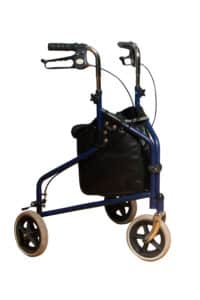Mobility problems are extremely common among elderly adults.
They can be caused by a wide variety of factors, including arthritis, joint weakness and pain, response to certain medications, cognitive functioning decline, and more. These problems can put your senior at risk for potentially serious injuries that can not only be harmful to their body but also diminish their quality of life and increase their risk for mortality in the coming months. As a family caregiver, it is very important for you to be aware of the issues your senior’s facing, and to know that your parent may not always bring these issues to your attention.

Mobility problems can be embarrassing for elderly adults, or they may be so accustomed to them, they do not even realize they are as serious as they are. Identifying early signs of mobility problems can enable you to confront these issues and make modifications to your care approach, your parent’s daily life, and they’re living environment to reduce the danger fears mobility problems may cause.
Some early signs your elderly adult might have mobility problems include:
-An increased instance of bruising that might show they have been falling or running into objects
-Rearranged furniture and items throughout the home that might indicate they have been using these items as support and leverage, or that they have been pushed out of the way as your parent fell
-Items are kept on the counter rather than in the cabinets, which might indicate they are having trouble with reaching or balancing to get items higher
-Trash is not taken out or is only taken out to the porch, which might indicate they cannot safely or confidently carry the trash and make their way to the trash can
-The house is not as tidy as it usually is, which might indicate they have difficulty reaching, leaning, or using cleaning implements
-They do not want to participate in activities like they used to
Flexibility is essential when it comes to being a family caregiver.
This is particularly true if you are a member of the sandwich generation and are caring for your children as well as your aging parents. Introducing home care into your care approach for your senior can give you more of that flexibility.
An in-home senior care services provider can step in to fill care gaps, manage specific tasks on a customized schedule, and ensure your senior is able to pursue an independent and engaged a lifestyle as possible without always having to rely on you. This enables both of you to live a higher quality of life and focus more on your parent-child relationship.
If you or an aging loved-one are considering hiring Elderly Care in Orinda, CA, call the caring staff at Aviva In-Home Care. Call today: (415) 795-2203
- Do You Need Help with Personal Care for Your Senior? - September 16, 2019
- Causes and Risk Factors for Shingles in the Elderly - September 12, 2019
- Five Reasons Your Senior Might Need a Daily Routine - September 5, 2019




